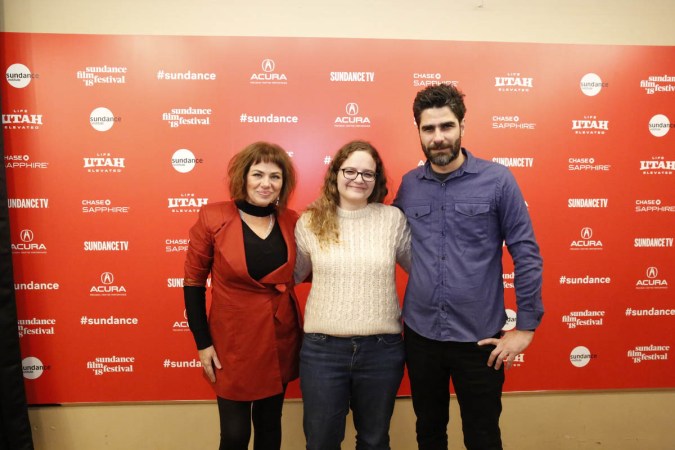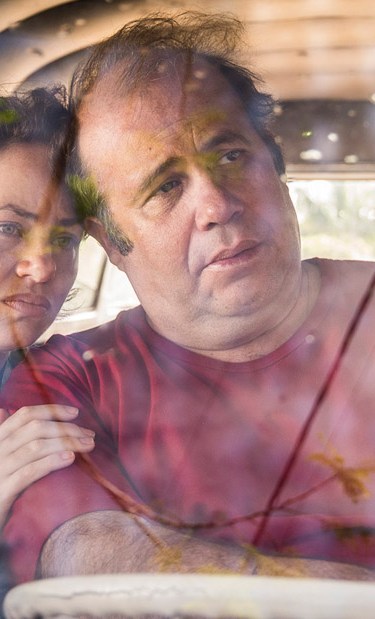Defying the limited interactions expected from two people that have decided to get a divorce, Brazilian director Gustavo Pizzi and actress Karine Teles (The Second Mother) remain close creative colleague and partners in parenthood. Although their marriage ended, the duo continues to write and produce content together, as it was the case with their most recent collaboration, Loveling (Benzinho), which premiered at this year’s Sundance Film Festival.
This is the second time the two act as co-writers in a film for Gustavo to direct and for Karine to play the lead, their first effort together, Craft (Riscado) premiered at SXSW in 2011. Loveling is an ode to working class mothers that celebrates their undying determination to not only provide bare necessities, but also positively influence their children’s lives. Teles embodies Irene, a woman whose older son, Fernando (Konstantinos Sarris) is about to move to Germany to play handball professionally. Added to her daily load, which includes caring for her other three kids, helping her sister leave an abusive relationship, and dealing with her mostly incompetent and idealist husband’s ideas, Irene is also trying to finish high school and be more financially self-sufficient. Irene’s everyday battles allow Karine to mesmerize with a genuine and heartfelt performance.
Even though neither of them would call the film biographical, there are certainly pieces of the story that evolved from personal material, including the central conflict: a parent coming to terms with the reality of her firstborn leaving the nest to pursue his passion. Like the character Fernando, both Pizzi and Teles followed their aspirations at an early age and didn’t look back at what that had meant for their parents. Now, in the opposite role, they are questioning what their own reaction will be when it’s time to face the initial separation from their beloved babies.
In a conversation with Remezcla, Gustavo and Karine gave us their personal perspective on why they chose to keep creating as a team despite their divorce, and how their roles as a father and a mother respectively plays into their art. Unapologetically and truly on point, Karine also preached hardcore truths about what’s expected of women in society and her approach to counteract those outdated judgments. Here are the highlights.
Gustavo Pizzi on How Becoming a Father Inspired Him to Make Loveling
I started thinking about this story when I had my child. I left home at an early age. I was just 16-years-old, like Fernando, the boy in the movie. Karine was 17 when she left home. When you are young you don’t look back, you just look to the future and the world in front of you. I started to think about my kids and that someday they will leave home too. Then I talked to my parents and told them, “I’m thinking about making a movie about that special moment when a kid leaves home.” They remembered for the first time in a while the moment that I left home. They were looking at the ceiling not saying anything. I asked them, “How was that moment for you guys?” They didn’t say much, they just said, “It was hard.” But I could see that there was a whole story in their minds about what happened that day. That moment made me feel certain that I had to make this movie.
Gustavo Pizzi on the First Time He Saw His Mother Cry
I used to play handball too like the character, and when I was leaving in the bus I could see my mother really far away, and she was always very strong and supported me, but at that moment I saw her crying, and crying, and crying. It was the first time I saw my mother cry. That’s why I really believed we should tell this story through the mother’s eyes because I think that women in Brazil and all over Latin America are the ones that keep the household running.
Gustavo Pizzi on Making a Coming-of-Age Story About a Mother
For us the story is a coming-of-age for the mother and not for the boy. There are thousands of coming-of-age movies, I really like them, but this was a way to bring another perspective. We could have done a movie about that boy, Fernando, going out into the world. We could go with him to Germany and see the whole team. It would be spectacular, but the other point of view, that of the mother, it’s really difficult to see. We thought we should talk about all the invisible women that are everywhere. We started writing the screenplay in 2013 and we were always thinking about why women are always in a worst situation than men. There is a culture based on machismo in Brazil. Machismo is really strong there still. We thought, “We have to fight against that.”

Gustavo Pizzi on the Process of Co-Writing with Karine Teles
We worked on the film the same way we raise the kids. We divided it the same way. There is no, “I wrote that line,” or “He wrote that part.” The way it works is, I write something and then I send it to her and we talk a lot, then she writes everything that she wants to write, rewrite, or change. She then sends it back to me and we talk. We started writing this film when we were still married and then we got divorced. We kept writing being divorced. In some versions of the script, right after we broke up, the fictional couple would fight a lot [laughs].
Karine Teles on Keeping Her Ex-Husband as Her Writing Partner
The first draft of the script was written while we were still married, but it takes a long time to make a film, to find the means to finance the film, and throughout this whole separation process we were still working on the script. After that first period of awkwardness between us, we managed to become friends again and work together again. We really like working together. I think we collaborate very well creatively and artistically, so we decided we wouldn’t break that up. We are still business partners, we have a production company together, and we raise our kids the same way, we are partners in raising them. We have shared custody. We had to find a way to work well together, to raise our kids and to do our film projects. We have a new one that we are shooting this year. It’s the same combination. We wrote it together, Gustavo is directing it, and I will act in it.
Karine Teles on Portraying a Working Class Mother
Our mothers are working-class mothers. This is very close to us, that feeling and understanding of how hard it is to have to fight for money every day and to find the means to provide for your kids. Of course, this is not my reality right now, but I did start working very young. I started working when I was 14. I always had to provide for myself throughout college, because my parents didn’t have the means to pay for my education. I had to do it by myself. In a way, most of those feelings are already inside of me, that’s why we wrote Irene that way. Some specific points about her character were very funny. We had a mixed crew, comprised of men and women, we had a lot of women in the crew, and in some scenes the man would be looking at my character and saying, “Isn’t that a little bit too much?” Like the scene where she lies on the ground saying, I can’t do it by myself. I’m too tired.” On the other hand, most of the mothers in the crew were like, “I know that feeling. It’s exactly like that. I’ve been there.”
Karine Teles on Not Forgetting Your Own Goals Once You Have Children
Becoming a mother is struggling between finding the way to balance the amount of love an effort you put into your kids and into yourself. I realized very early on that the most important thing a parent can do is to be a good person and to be happy. That’s the most difficult thing to do as a mother, because your instinct is just to let yourself go and take care of your kids. Leave it all behind and just be there for them. I always have to remember that taking care of myself is as important as taking care of them, and it’s a very hard thing to do. I think this is the fight we have to fight as women.
Karine Teles on People Refusing to Detach a Woman’s Identity from Her Kids
Two years after my kids were born, when I went out, to a party or to a bar, people would always ask, “Where are the boys? Who are they with?” And I would say, “I left them in a cage. I left them some water and food. They are okay, you don’t need to worry.” That’s a stupid question to ask. If I’m there of course they are with someone who is taking care of them right? People just don’t detach you from your kids anymore. It’s like your identity has become your kids, and that doesn’t happen to men. It happens only to women. Gustavo shares custody with me and he takes care of the boys too, but he’s never asked, “Where are your kids?” when he is at a party. It’s a struggle, and step-by-step we are changing things. I’m happy that people are rethinking the way they deal with these issues.




